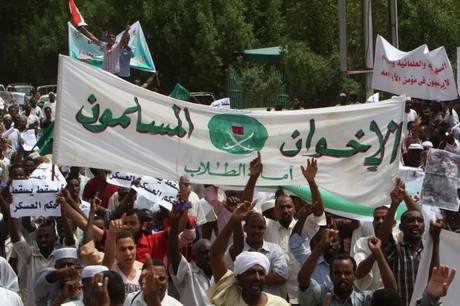Egypt Brotherhood May Radicalize after Terror Listing
إقرأ هذا الخبر بالعربية
The military-installed government's listing of Egypt's Muslim Brotherhood as a terrorist group signals determination to uproot its vast grass-roots network, possibly radicalizing the Islamists as they go underground, analysts said.
Security forces had already decimated the group following Islamist president Mohammed Morsi's overthrow in July, with more than 1,000 people killed and thousands more imprisoned, including the Brotherhood's top leadership.
The last major crackdown on the Brotherhood, by president Gamal Abdel Nasser in the 1950s and 1960s, led several members to break off and form more radical groups that are now seen as precursors to al-Qaida.
Now analysts fear a similar process could unfold, with a new generation of activists breaking from the Brotherhood's more cautious leadership, most of whom are imprisoned with little communication to the outside world.
"It is impossible to dismiss the idea that at least a fringe group of the repression's victims will choose counter-violence and join the jihadists," said Francois Burgat, a Beirut-based expert on Islamist movements.
The decision to list the Brotherhood as a terrorist group came after the deadly bombing of a police station on Tuesday that killed 15 people and was claimed by Ansar Beit al-Maqdis, an al-Qaida inspired group spearheading attacks in the Sinai peninsula that have killed scores of police and soldiers since Morsi's overthrow.
The group has no known link to the Brotherhood, and jihadist groups have long criticized the Brotherhood's refusal to take up arms and its embrace of elections, seen by radicals as un-Islamic.
But the government blamed the Brotherhood for the bombing, and Morsi along with other top Islamists already face trial for allegedly colluding with militants to carry out attacks.
Following the terrorist designation, anyone taking part in the protests the Brotherhood has held on a near-daily basis demanding Morsi's reinstatement could be sentenced to five years in prison, according to the interior ministry.
Possessing Brotherhood literature, or supporting them "verbally or in writing" is also punishable by up to five years in prison, it said in a statement.
Repression could foster violence
The 85-year-old Brotherhood was the most well-organized opposition group during decades of dictatorship and prevailed in a string of polls held after the 2011 overthrow of Hosni Mubarak.
But in the group's early days it did not shy away from violence. The Brotherhood was responsible for a string of assassinations in the 1940s, and was accused of trying to assassinate Nasser, the pan-Arab nationalist icon, in the 1950s.
That led to a major crackdown in which Brotherhood members were jailed and tortured, leading some to break away and form armed groups that went on to launch a wave of attacks on security forces and foreign tourists.
But the Brotherhood itself renounced violence in the 1970s, and instead focused on social work and grass-roots political organizing.
But Morsi's overthrow, just one year after becoming Egypt's first democratically elected president and the jailing of top leaders could prompt younger cadres to rethink their tactics.
"We may discover this has had a negative impact, the absence of an organization," said one Brotherhood spokesman, who requested anonymity.
The crackdown has come amid a groundswell of loathing and distrust of the Brotherhood that built up during Morsi's rule, which could erode the group's long-held belief that it could bring about a more Islamic Egypt through social work and political advocacy.
The organization itself is likely to remain committed to its stated strategy of peaceful protest, said Omar Ashour, a senior lecturer in Middle East politics at the University of Exeter.
"Internally they have been preaching since the late sixties that taking up arms is illegitimate and ineffective," he said.
But "if you decapitate the leadership, especially if the leadership is not pro-violence, you could end up with members taking up arms."



